Cinema Paradiso Blu-ray Movie
HomeCinema Paradiso Blu-ray Movie 
Nuovo cinema Paradiso / Arrow AcademyArrow | 1988 | 1 Movie, 2 Cuts | 174 min | Not rated | Mar 21, 2017
Movie rating
8.4 | / 10 |
Blu-ray rating
| Users | 0.0 | |
| Reviewer | 4.5 | |
| Overall | 4.5 |
Overview
Cinema Paradiso (1988)
A filmmaker recalls his childhood, when he fell in love with the movies at his village's theater and formed a deep friendship with the theater's projectionist.
Starring: Antonella Attili, Enzo Cannavale, Isa Danieli, Leo Gullotta, Marco LeonardiDirector: Giuseppe Tornatore
| Drama | Uncertain |
| Foreign | Uncertain |
| Period | Uncertain |
| Melodrama | Uncertain |
| Coming of age | Uncertain |
| Comedy | Uncertain |
Specifications
Video
Video codec: MPEG-4 AVC
Video resolution: 1080p
Aspect ratio: 1.67:1
Original aspect ratio: 1.85:1
Audio
Italian: DTS-HD Master Audio 5.1 (48kHz, 24-bit)
Italian: LPCM Mono (48kHz, 24-bit)
Italian: LPCM 2.0 (48kHz, 24-bit)
Theatrical: LPCM Mono; Director's: LPCM 2.0
Subtitles
English
Discs
Blu-ray Disc
Two-disc set (2 BDs)
Playback
Region A, B (C untested)
Review
Rating summary
| Movie | 4.5 | |
| Video | 5.0 | |
| Audio | 4.0 | |
| Extras | 4.5 | |
| Overall | 4.5 |
Cinema Paradiso Blu-ray Movie Review
Reviewed by Jeffrey Kauffman March 18, 2017The annals of cinema are stocked full of offerings which are either love letters to the Art of Film, or sometimes more like nasty postcards. Movies as disparate as Singin' in the Rain, The Player, Sunset Boulevard, Adaptation. , The Stunt Man, Ed Wood and Sullivan's Travels prove what a fertile ground the very industry which gave birth to these offerings has been for various filmmakers. But for the initial purposes of this review, it might be best to think about one of the most iconic (if seemingly tangential) cinematic references to the movie making business, Federico Fellini’s legendary 8½ . While there are manifest differences between Fellini’s unforgettable film and Giuseppe Tornatore’s Cinema Paradiso, both films are unavoidably Italian in perspective and both feature a somewhat addled film director who is awash in the vagaries of memory. Tornatore’s take on this foundation is decidedly less surreal than Fellini’s (not that that would be very hard to accomplish), but both films are suffused with a really palpable sense of emotion that is often at least somewhat similar. Lionsgate released a bare bones version of Cinema Paradiso several years ago which offered only the theatrical cut of the film and next to no supplements. Arrow is back now with a beautiful new package offering both versions of the film culled from new scans of the original camera negatives, and coming replete with some excellent supplementary material.
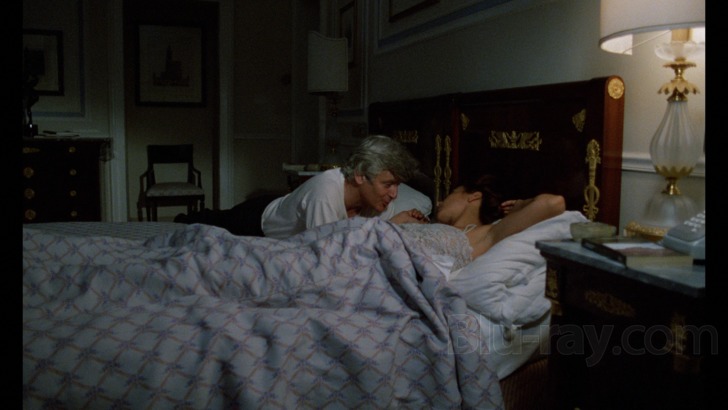
Rather than rehash all of the plot dynamics of Cinema Paradiso, I’ll instead point you to my original Cinema Paradiso Blu-ray review of the Lionsgate release. That said, that review deals with the Theatrical Version, and this new Arrow offering presents the substantially longer Director’s Cut. Some of that length is frankly unnecessary, offering brief new vignettes surrounding how famous film director Salvatore Di Vita (Jacques Perrin as the adult Salvatore) is alerted to the fact that Alfredo (Philippe Noiret), the beloved projectionist at the movie house in the village where Salvatore grew up, has died. There’s additional footage in the long flashback sequences detailing the initially kind of contentious relationship between the young Salvatore (an absolutely adorable Salvatore Cascio) and Alfredo, as well as even more information imparted about a starcrossed love affair the teenage Salvatore (Marco Leonardi) undertakes with village girl Elena (Agnese Nano). That in turn offers a rather extended set of sequences in “contemporary” time where the adult Salvatore, having returned to Giancaldo, tries to reunite with Elena (played by Brigitte Fossey as an adult).
The Director’s Cut is a manifestly different experience than the shorter Theatrical Version, probably spending what some may feel is a bit too much time on somewhat extraneous data like Salvatore’s love life, but never journeying that far from the shorter version’s focus (no pun intended) on Salvatore’s love of film. Interestingly, commentator Millicent Marcus makes the case that one of the chief conflicts of Salvatore is that he feels true love and Art mix like oil and water, something that is probably detailed a bit more thoroughly in the Director's Cut (though ironically Marcus' commentary is on the Theatrical Version). What is unmistakable in both versions, though, and which has become an even more relevant (if subliminal) plot point in the era of home video, is how the whole film going experience for the villagers is a celebration of community.
Cinema Paradiso Blu-ray Movie, Video Quality 
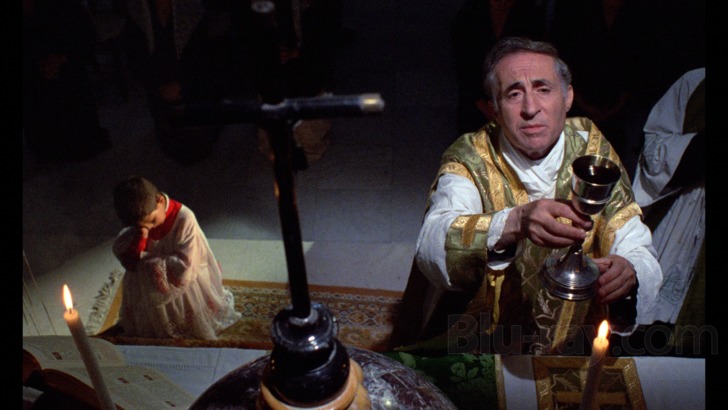
Cinema Paradiso is presented in two versions on two discs by Arrow Video with AVC encoded 1080p transfers in 1.67:1. As I tend to do when I'm revisiting titles I've previously written about, I highly recommend simply comparing screenshots to form your own opinion rather than relying on my descriptive powers. With that in mind, I've tried to mimic some of the screenshots from the Cinema Paradiso Blu-ray review of the Lionsgate release, especially with regard to the shared Theatrical Version (represented by screenshots 1-10 in this review). I've also attempted to repeat a few (but not all) of those screenshots in the examples of the Director's Cut (screenshots 11-20). Also, for informational purposes I've included the text card that precedes both versions of the film in position 23 of the screenshots. The typically informative booklet Arrow includes with this release contains additional information about the transfer:
The original 35mm negative was scanned in 2K resolution on a pin registered Arriscan at Technicolor Rome. The film was fully graded using the Nucoda Film Master colour grading system. Restoration work was carried out using a combination of software tools and techniques. Thousands of instances of dirt, scratches and debris were carefully removed frame by frame. Damaged frames were repaired, and density and stability issues were significantly improved.There's really no discernable difference (that I could see, anyway) between the footage shared by the Theatrical Version and Director's Cut on this release. There are some notable differences between this new version (and/or versions) and the Lionsgate release, however. It's obvious that this new release is darker than the Lionsgate release, with a much more clearly apparent grain field, but I now tend to think that the Lionsgate release may have had some brightness boosting applied, since I'm considerably more pleased by the overall look of the palette on this new release, especially with regard to flesh tones. As I noted in the review of the Lionsgate release, those who have never seen Cinema Paradiso theatrically or in previous home video versions may be surprised at that aforementioned "texture" that is clearly on display, especially in this new release, and while there's occasional yellow chunkiness on display, Arrow's compression regimen handles the frequently heavy grain rather well. There's a noticeable uptick in clarity in the most brightly lit outdoor sequences, notably some of the daytime scenes in the town square. Restoration efforts have delivered elements with no discernable damage. Arrow has kept their word about the lack of digital tweaking, for there are (not to state the obvious) no signs of degraining and also no signs of artificial sharpening.
Throughout the restoration process, care was taken to ensure that the film's original texture, details, grain structure and soundtrack remained unaffected by digital processing.
Cinema Paradiso Blu-ray Movie, Audio Quality 
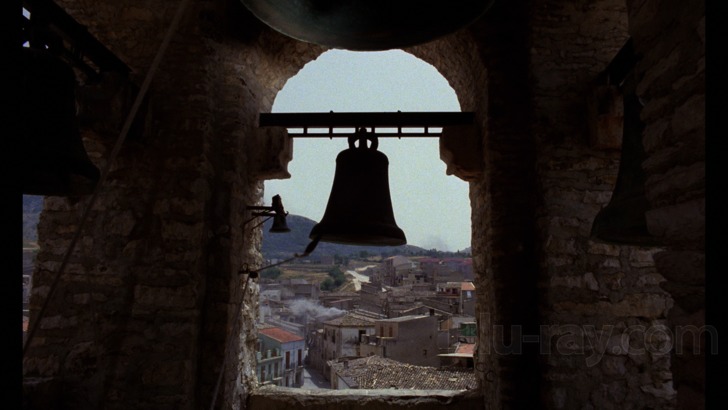
Unlike the Lionsgate release, which featured only a mono track, the Theatrical Version sports both an LPCM Mono and a DTS-HD Master Audio 5.1 track, while the Director's Cut features an LPCM 2.0 (stereo) track along with the DTS-HD Master Audio 5.1 track (kind of funnily, the trailer for the Director's Cut hawks the film as being "now in stereo"). The mono track on the Theatrical Version is very much in keeping with the track on the Lionsgate release, somewhat (unavoidably) narrow sounding, but easily supporting dialogue and Ennio Morricone's ravishing score. As I suspected in my review of the audio of the Lionsgate release where I was supposing what a surround mix might add to the film, the answer is: really not that much. Morricone's music certainly gets a bit more breathing room, though I have to say the wider spatial placement sounded a bit artificial to me, kind of like those old "reprocessed for electronic stereo" record releases that older audiophiles may recall. The 5.1 mix on both versions does add a bit of activity in the raucous scenes in the movie theater or where crowds are otherwise filling the frame. The stereo mix on the Director's Cut is fairly subtle, adding minor but noticeable separation to both Morricone's score and those selfsame boisterous scenes with large populations crowding the frame. All of the tracks sport excellent fidelity. For my personal listening tastes, I'd say stick with the original mono and stereo tracks, but that's obviously simply my personal preference.
Cinema Paradiso Blu-ray Movie, Special Features and Extras 
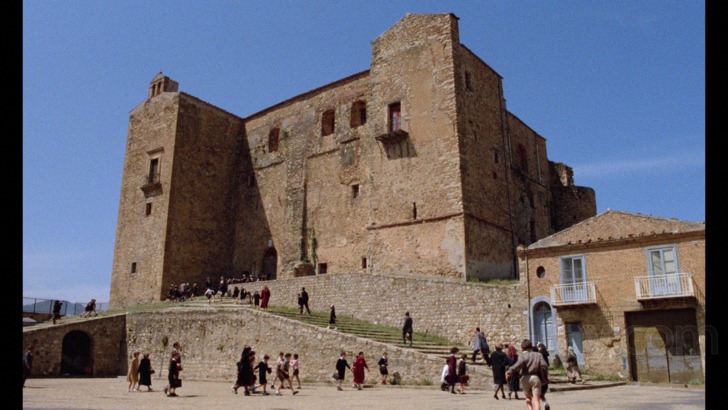
Since one version of the film could arguably be considered a supplement by some, I've included both versions in the complete listing of what's on
each
disc in this set.
Disc One
- Theatrical Version (1080p; 2:03:50)
- Audio Commentary with director Giuseppe Tornatore and Italian cinema expert critic Millicent Marcus is really mostly the very erudite and listenable Marcus, with a few interstitial comments by Tornatore edited in. A very worthwhile commentary in any case.
- A Dream of Sicily (1080p; 54:45) is a wonderful profile of Giuseppe Tornatore full of reminiscences by him as well as some really interesting early home movies (including of a big fire which may have inspired one of Cinema Paradiso's most memorable set pieces).
- A Bear and a Mouse (1080i; 27:26) is a sweet documentary featuring nice (latter day) interviews with Tornatore, Philippe Noiret and a grown up Salvatore Cascio.
- The Kissing Sequence (1080i; 7:01) offers Tornatore discussing this famous scene in the film, which is then followed by a listing identifying all of the clips utlized.
- 25th Anniversary Trailer (1080p; 1:40)
- Director's Cut (1080p; 2:53:31)
- Director's Cut Trailer (1080p; 1:24)
Cinema Paradiso Blu-ray Movie, Overall Score and Recommendation 
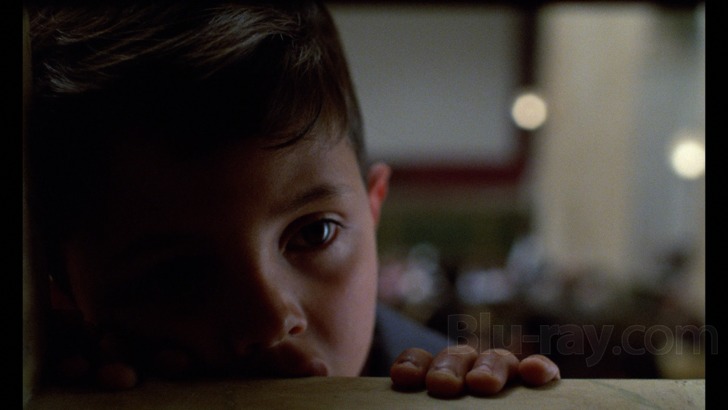
Even those of you who sprang for the Lionsgate version a few years ago should feel no compunction about double dipping in this particular case, for the technical improvements of the Arrow release are substantial and the supplementary material is outstanding. Plus, both versions of the film are presented, and they're each manifestly different viewing experiences. I have been head over heels in love with Cinema Paradiso since I first saw it at an art house theatrical screening decades ago, and I fell in love with it (in both versions) all over again watching this excellent new release from Arrow. Highly recommended.
Other editions
Cinema Paradiso: Other Editions

Cinema Paradiso
Nuovo cinema Paradiso
1988

Cinema Paradiso
Nuovo cinema Paradiso
1988

Cinema Paradiso
Nuovo cinema Paradiso / Exclusive Slipcover
1988

Cinema Paradiso
Special Edition | Nuovo cinema Paradiso | Arrow Academy
1988

Cinema Paradiso 4K
Nuovo Cinema Paradiso 4K | Director's cut on BD | Arrow Academy | Special Edition
1988
Similar titles
Similar titles you might also like

Amarcord
1973

I Vitelloni
1953

The Great Beauty
La grande bellezza
2013

Moonrise Kingdom
2012

We Are the Best!
Vi är bäst
2013

The Conformist
Il Conformista | 4K Restoration
1970

Umberto D.
1952

1900
Novecento | Three-Disc Collector's Edition
1976

20th Century Women
2016

Baarìa
2009

Bicycle Thieves
Ladri di biciclette
1948

Reality
2012

Il Sorpasso
The Easy Life
1962

Adua e le compagne
Adua and her Friends
1960

The Hunt
Jagten
2012

La Dolce Vita
1960

Small Change
1976

Cemetery of Splendor
2015

Roma
Fellini's Roma
1972

Pain and Glory
Dolor y gloria
2019
